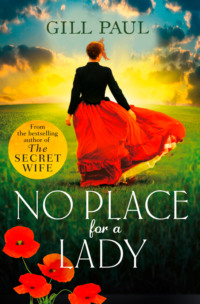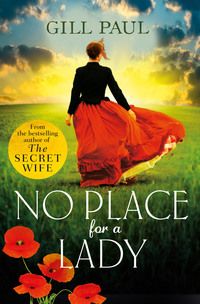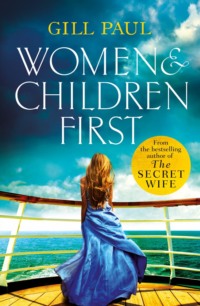
Полная версия
The Affair: An enthralling story of love and passion and Hollywood glamour

THE AFFAIR
GILL PAUL


Copyright
Published by Avon,
an imprint of HarperCollinsPublishers Ltd
1 London Bridge Street
London SE1 9GF
www.harpercollins.co.uk
First published in Great Britain by HarperCollinsPublishers Ltd 2013
Copyright © Gill Paul 2013
Cover [photograph © Getty Images; Arcangel Images.
Cover design © HarperCollinsPublishers Ltd 2013
Gill Paul asserts the moral right to be identified as the author of this work.
A catalogue copy of this book is available from the British Library.
This novel is entirely a work of fiction. The names, characters and incidents portrayed in it are the work of the author’s imagination. Any resemblance to actual persons, living or dead, events or localities is entirely coincidental.
All rights reserved under International and Pan-American Copyright Conventions. By payment of the required fees, you have been granted the non-exclusive, non-transferable right to access and read the text of this e-book on screen. No part of this text may be reproduced, transmitted, down-loaded, decompiled, reverse engineered, or stored in or introduced into any information storage and retrieval system, in any form or by any means, whether electronic or mechanical, now known or hereinafter invented, without the express written permission of HarperCollins.
Source ISBN: 9781847563262
Ebook Edition © May 2013 ISBN: 9780007494118
Version: 2018-06-05
To Anne Nicholson, my lovely aunt,
who always encouraged me to write
Contents
Cover
Title Page
Copyright
Dedication
Foreword
Chapter One
Chapter Two
Chapter Three
Chapter Four
Chapter Five
Chapter Six
Chapter Seven
Chapter Eight
Chapter Nine
Chapter Ten
Chapter Eleven
Chapter Twelve
Chapter Thirteen
Chapter Fourteen
Chapter Fifteen
Chapter Sixteen
Chapter Seventeen
Chapter Eighteen
Chapter Nineteen
Chapter Twenty
Chapter Twenty-One
Chapter Twenty-Two
Chapter Twenty-Three
Chapter Twenty-Four
Chapter Twenty-Five
Chapter Twenty-Six
Chapter Twenty-Seven
Chapter Twenty-Eight
Chapter Twenty-Nine
Chapter Thirty
Chapter Thirty-One
Chapter Thirty-Two
Chapter Thirty-Three
Chapter Thirty-Four
Chapter Thirty-Five
Chapter Thirty-Six
Chapter Thirty-Seven
Chapter Thirty-Eight
Chapter Thirty-Nine
Chapter Forty
Chapter Forty-One
Chapter Forty-Two
Chapter Forty-Three
Chapter Forty-Four
Chapter Forty-Five
Chapter Forty-Six
Chapter Forty-Seven
Chapter Forty-Eight
Chapter Forty-Nine
Chapter Fifty
Chapter Fifty-One
Chapter Fifty-Two
Chapter Fifty-Three
Chapter Fifty-Four
Chapter Fifty-Five
Chapter Fifty-Six
Chapter Fifty-Seven
Chapter Fifty-Eight
Chapter Fifty-Nine
Chapter Sixty
Chapter Sixty-One
Chapter Sixty-Two
Chapter Sixty-Three
Chapter Sixty-Four
Chapter Sixty-Five
Chapter Sixty-Six
Chapter Sixty-Seven
Chapter Sixty-Eight
Chapter Sixty-Nine
Chapter Seventy
Chapter Seventy-One
Chapter Seventy-Two
Chapter Seventy-Three
Chapter Seventy-Four
Chapter Seventy-Five
Epilogue
Acknowledgments
About the Author
Enjoyed this book? Read on for the start of Gill Paul’s new novel, Another Woman’s Husband.
By the Same Author
About the Publisher
Foreword

Ischia, June 1962
The sun hadn’t yet risen but a glow was reflected in the eastern sky and the steely Mediterranean was beginning to lighten. An elderly fisherman sat on a wooden bench, struggling to knot frayed ends of a broken net. He liked the stillness of the hour before dawn. The air was uncannily quiet: no breeze, no birdsong, no hum of insects, just the regular shushing of waves.
Over a fence to his left, like a mirage, there were dozens of wooden boats from ancient times moored along a newly built jetty, to be used in a Hollywood movie. Banks of oars protruded from the sides of the vessels, and the sterns and prows curled ornately inwards. He’d heard they were to be destroyed in a mock sea battle and he shook his head at the extravagance. So much craftsmanship, all to be smashed to pieces – the world had gone mad.
He heard a murmur of voices before he saw two dark figures creeping down to the shore. There was a woman’s laugh. They wouldn’t see him where he sat with his back to a rock but he watched as she stuck a toe into the water and shrieked at the cold. Her companion said something indistinguishable; there was no doubt it was a man. They were drinking from a bottle, and when it was drained the man threw it in the water. The fisherman let slip a tutting sound and the man turned in his direction as though he had heard.
Suddenly he grabbed the woman’s arm and pulled her onto the sand. It won’t be comfortable there, the fisherman thought, with small griping stones and the odd piece of sea glass. Sometimes stinging shellfish burrow under the surface; that would give her a start. Every second the air was lightening and now he could see that the man was lying on top of her. They’re not married, the fisherman guessed. Who would choose to fornicate on a jagged shore instead of the comfort of the marriage bed? The thought briefly made him sigh for the memory of his wife, who’d passed four years ago, and for the vast comfort of her body.
Now the man was humping against the woman beneath him. Did he know there was a witness? Did that excite him? The fisherman took no pleasure in watching – there was no stirring in his loins – but all the same he didn’t look away. When they finished, she stood to brush the stones from her back, and he could tell from the tone of her voice that she was laughingly complaining of small injuries. The man kissed her, and they spoke in lowered voices, but soon after he turned and walked back up the hill.
Instead of following, the woman began to stroll along the front, gazing out at the pink horizon, her shoes dangling from her hand. She crossed into the area where the fisherman’s boat was hauled up on shore, and stood there for some time just watching.
Once the tip of the sun’s brilliant-white dome had slid over the horizon and you could already feel the beginning of the day’s heat, she spun around and began to walk up the shore path directly towards the fisherman. As she got close, he saw that she was a beauty, and a familiar one.
She was startled when she noticed him, but said ‘Buongiorno’ in an American accent. She watched him, as if trying to gauge how much he had seen, and as she passed she gave him a wink.
He nodded briefly. She should put her shoes on, he thought. There were fish-hooks on the ground, easy to miss but hard to remove from the flesh. But he didn’t know how to say that in English, so instead he carried on mending his net.
Some time later, the sun glinted on an object lying in the sand where the couple had been. The fisherman walked down to investigate and saw it was a piece of jewellery made of brilliant stones. He picked it up, surprised by the weight. He’d never seen diamonds before but had no doubt that’s what they were. He considered for a minute, then slipped the object in the pocket of his oilskin trousers before going back to his net.
Chapter One

London, July 1961
‘I have a telephone call from Los Angeles. In America. Just connecting you.’
‘I think there’s some mistake …’ Diana protested – she didn’t know anyone who lived in America – but her voice was lost in a succession of clicks and buzzes as the operator pushed plugs into a switchboard.
‘I’m putting you through to Mr Wanger,’ said a cheery American voice, and Diana raised her eyebrows in surprise. He was the producer of a film about Cleopatra they had been making at Pinewood Studios the previous winter but the plug had been pulled after its star, Elizabeth Taylor, suffered a bout of near-fatal pneumonia.
Walter came on the line, his voice sounding as though he was in a cave somewhere far off. She could hear her own voice echo disconcertingly, and kept pausing for the sound to subside.
‘We need you in Rome,’ Walter said. ‘We start rolling at the end of September but come as soon as you can.’
‘You need me? Whatever for?’ She had spent one day at Pinewood giving him advice on their gaudy sets, and since she had basically told him they needed to start from scratch if they were aiming at historical accuracy, she’d never expected to hear from him again.
‘You’ve got a PhD in Cleopatra from Oxford University, you’re the British Museum’s top expert, there’s no one else who could bring such authority to the production. Frankly, without you it will only be half the movie it could be. You must come, Diana.’
‘How long would you need me for?’
‘Certainly no longer than six months,’ he said. ‘Perhaps a little less.’
She gasped. She’d been thinking it might be a week at most, but Walter explained that he wanted her on hand throughout the shooting. He was offering a salary that was almost double what she currently earned – even more than her husband Trevor earned as a university lecturer – and generous expenses as well. The studio would find her a room in a pensione and she’d be ferried around by a studio driver. Walter kept talking, mentioning all the perks she would enjoy, and the fact that there would even be a credit for her in the final movie. Diana hardly got a word in edgeways.
The possibility that she might turn down his offer didn’t seem to enter his mind and Diana didn’t voice her reservations because it all sounded so glamorous. She had never been to Rome; in fact, she had only been overseas once before on a student research trip to Egypt. If she were there while the film was being shot, she would surely get to watch the stars at work, which would be exciting. And she was flattered by Walter Wanger’s faith in her.
But looking round their little sitting room after the long-distance call ended, Diana thought again. How could she leave Trevor? She’d miss him terribly and he’d be lost without her. He was incapable of cooking a nutritious evening meal. Without her around he would probably live on toasted crumpets and cold baked beans straight from the can. He couldn’t heat a tin of soup without burning it and he had shrunk all his clothes the one and only time he tried to operate the twin-tub washing machine. She was his wife. It was her duty to look after him.
Fortunately he’d never been one of those men who thought women should give up work on marriage. He’d always applauded the fact that she had a career and encouraged her to take her job seriously; so maybe he would agree to her taking up this opportunity. Six months wasn’t so long in the great scheme of things.
Trevor got home late after a meeting of the Victorian Society, and Diana brought him a cup of tea and a plate of cold meat sandwiches for supper before telling him about the offer.
‘You’ve got to be joking!’ was his first reaction. ‘How presumptuous of him to ask a married woman to leave her husband for months on end!’
‘I know it seems a lot, darling, but there are expenses to cover trips back to London, and you could come over to Rome. We could probably spend every weekend together, either here or there. And we’d be able to save lots of money to help us get a bigger place for when …’ Her voice trailed off.
They’d been trying for a baby ever since she finished her PhD but with no success to date. ‘Maybe we’re doing it wrong,’ Trevor had quipped to hide his disappointment when her last period started. ‘We obviously need more practice.’ She’d felt guilty, as if it were her fault she wasn’t falling pregnant. She’d read in a magazine that it was almost always something wrong with the woman.
‘Neither of us is getting any younger,’ Trevor reminded her now. ‘I don’t want to be too old and arthritic to teach my son to ride a bicycle. And your eggs might go rotten if they’re left too long.’
‘I don’t think six months will make much difference,’ she argued, but she knew it concerned him because he was eighteen years older than her and already well into his forties.
‘Your head will be turned. Walter Wanker will ask you to advise on his next film and the one after that and before you know it you’ll be swanning all over the world without ever needing to use your brain. Did you know he made Invasion of the Bodysnatchers? I’m beginning to feel that’s what has happened to you. Aliens have come and replaced you with a substitute Diana who is a completely different person from the woman I married.’ He smiled and rubbed her knee, trying to turn it into a joke, but she could tell he was upset.
‘I’m still me,’ she said, reaching out to hold his hand. ‘I’m still your wife. I suppose I’ve just been feeling that I want a bit of excitement before I settle down to motherhood. I’ll be tied to the home for twenty years or more once I’m bringing up our brood, and advising on the film would be a little adventure I could have first: something exciting to tell our children and grandchildren about one day.’
A hurt look clouded his eyes. ‘So our life isn’t exciting? What about all those thrilling departmental sherry evenings?’
She smiled at the sarcasm. ‘I like our life, really I do. I even like the sherry evenings – but sometimes I feel trapped.’ He took a sharp intake of breath so she continued quickly. ‘It’s as if my life is all mapped out for me and I have to stick precisely to the plan. I’d love it if you were transferred to Rome for six months – or anywhere foreign – and I could jet out to visit you at weekends. I’d love to travel more and explore foreign cities.’
‘We can do all that some day, but you know that right now I have to build my reputation by publishing another book – if I can ever find the time. It would set me back months if I had to start doing laundry and housework on top of my course work because you were off gallivanting on a film set.’
‘Bring your laundry to Rome at weekends and I’ll do it for you there,’ she quipped thoughtlessly.
‘Now you’re being silly,’ he snapped, and there was a hint of anger in his tone, which he quickly disguised. ‘Can you imagine me arriving in the Eternal City every weekend with a suitcase full of sweaty socks? If they decided to search my case at customs, they’d pass out from the fumes.’
‘Perhaps I could use some of my salary to hire you a charlady.’
‘Oh, it’s your salary now, is it? I pay the rent on the flat here with my salary, and you get to make charitable offers with yours. Is that it?’
‘I didn’t mean it that way,’ she whispered, annoyed with herself. Perhaps she shouldn’t rub it in that she would be earning more than him. This was the closest they’d come to arguing for a long time and she knew she was handling it badly.
‘Besides, I thought you wanted to apply for a junior lecturer’s post as soon as something suitable comes up. What would the selection panel think of a six-month sabbatical spent on a Hollywood movie? It doesn’t make you seem a very serious person.’
Diana was silent for a moment. She knew she would always have regrets if she backed down and didn’t grab this opportunity. ‘The truth is that I’m not as serious as you, Trevor. I’m bored with academia. I want a new challenge out there in the wider world instead of the dusty little part of it we’re used to.’
Trevor was staring down at his lap. ‘Can’t you find a new challenge in London? I’d be miserable without you, darling.’ When she didn’t reply, he stood up. ‘Anyway, I’ve got a full day tomorrow in boring old academia so I’d best go to bed now.’ He kissed her quickly on the cheek as if to say ‘no hard feelings’. ‘You won’t be long, will you?’
‘I fancy another cup of tea. Warm the bed for me.’
In the kitchen, Diana sat at the red Formica kitchen table holding a piece of paper with Walter Wanger’s phone numbers on it, scrutinising them as if the answer was hidden there in secret code. What was she playing at? She yearned to see Rome – but then she and Trevor could always go there on holiday. She was curious to see what life was like on a film set, but maybe Walter would let her go for a shorter period, perhaps just up to Christmas. Would Trevor accept that? She felt a pang, and knew that once she got involved in the film she wouldn’t want to leave halfway through.
Was she being intolerably selfish? Yes, she knew she was. She was the wife, the homemaker, and it wouldn’t be fair to leave Trevor in the lurch for so long. Her career should be secondary to looking after his needs. It’s just that she’d thought she and Trevor were somehow more modern and progressive than other couples. That’s one of the things she liked about their relationship.
Her head was swirling with thoughts and she couldn’t make them quiet down. She knew she should go through to the bedroom, climb into bed beside him and whisper, ‘Of course I won’t go. I’m sorry for suggesting it.’ He’d turn to kiss her and all would be well. That’s what she must do, she decided, but she didn’t stand up. There was a hard little nugget in her heart, a selfish nugget perhaps, but a stubborn one.
The clock on the mantelpiece struck midnight and then one o’clock and still Diana sat there, her head in her hands. Was there any argument she could use to persuade Trevor to let her go? The money would be useful, but every other reason sounded trivial. Women like her simply didn’t do things like this. But she desperately wanted to. The more she thought about it, the more she knew she couldn’t bear to let this opportunity slip through her fingers. She had to persuade him. Somehow she must.
At three a.m., she went through to the bedroom and crawled into bed. Trevor was in the depths of sleep and barely moving. She could feel the warmth emanating from his body but she felt bereft at the seemingly unbridgeable distance between them.
Chapter Two

Rome, July 1961
‘Un espresso, per favore,’ Scott Morgan called to a waiter, then sat down and folded his long legs under a pavement table. The air in the Piazza Navona was thick with petrol fumes and the sun was already fierce, exacerbating the pounding in his temples. He pressed his fingers into his eye sockets.
‘Hai avuto una bella sbornia sta’notte, eh?’ the waiter joked as he brought the coffee, then mimed glugging back a drink and staggering drunkenly. Some tourists at the next table sniggered.
‘Grazie Giovanni, non prendermi in giro!’ He managed a feeble grin.
The waiter was absolutely right, of course. He’d been out drinking with the foreign press pack the night before and, swept along by the camaraderie of shared anecdotes and enjoying the feeling of being a ‘real journalist’, he’d allowed himself to down several more whisky shots than was prudent. The others had egged him on, eager to see the youngest of their number pass out or throw up his supper all over the roof terrace of the Eden Hotel.
Scott sensed a certain jealousy from these raddled old hacks, who had worked their way up from junior copy-taking roles on local rags to reach the height of their careers as Italian correspondents for national papers back home. It was a posting they felt they had earned after long years of covering rodeos and manning the obituaries page, so it would hardly be surprising if they resented the fact that Scott had walked straight into the role from college, with only a Harvard degree in international relations and several pieces in the Harvard Crimson to recommend him. Granted, he wasn’t working for The New York Times or the Washington Post. His paper, the Midwest Daily, was a respectable middle-market title, popular with farmers in the Bible Belt, but it was still a prestigious place to start his career. He didn’t tell the others that the job had been offered after a phone call from his father, who owned a substantial stake in the business.
Scott had arrived in Rome in May and the first thing he did was buy himself a Vespa, a pair of Ray-Ban sunglasses and some black cotton turtlenecks. He wanted to be like the ultra-cool character played by Marcello Mastroianni in La Dolce Vita, seducing beautiful women all over town and fêted by the famous for the exposure he could get them, while at the same time filing serious, important stories that would win the admiration of his peers. So far the reality hadn’t quite lived up to the image. In fact, he’d failed to get a single story in print since his arrival two months earlier, something the hacks hadn’t hesitated to tease him about the previous evening.
‘Had all your stories spiked, then? We should call you “Spike”. What do you reckon, boys?’
They’d all joined in. ‘Pass the ashtray, Spike.’ ‘Fancy another shot, Spike?’
When he read his compatriots’ stories, about the strange allegiances between Italian political parties or impenetrable agriculture statistics from the south of the country, he had to suppress a yawn. Maybe that’s what he should be doing, but he couldn’t write stories like that because he didn’t have the contacts. He’d expected to find a well-staffed office full of people who would set up interviews for him. All he’d have to do would be turn up, ask some insightful questions, and scribble off his piece. Instead, his only colleague was a middle-aged Italian woman who answered the phone and typed his correspondence. His predecessor, a journalist called Bradley Wyndham, had left without passing on any contact numbers or advice and it was entirely up to Scott to make his own way.







